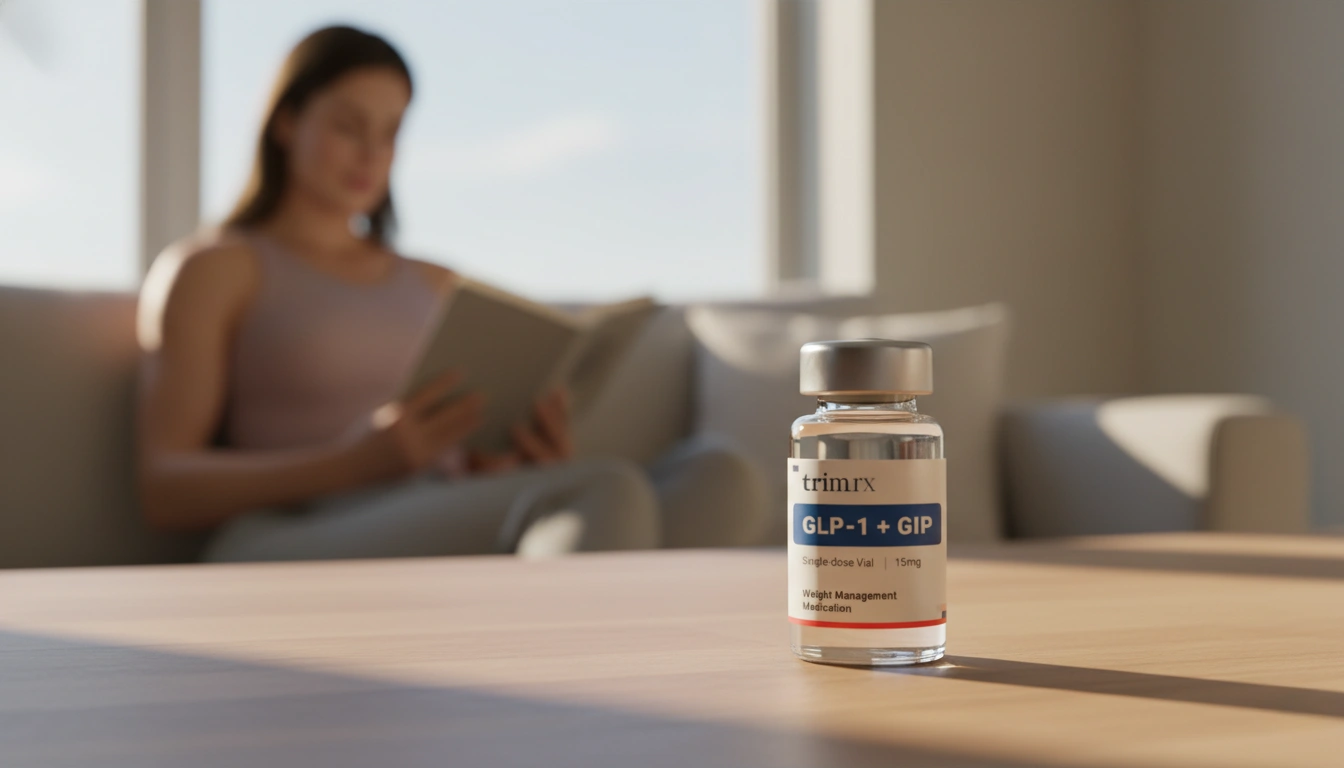When to Stop Taking GLP-1: Navigating Your Weight Loss Journey

Introduction
Have you ever found yourself on a weight loss journey, only to wonder when it’s time to stop taking that miracle medication? With the recent surge in popularity of GLP-1 receptor agonists like Ozempic® and Wegovy®, many individuals are left pondering their long-term usage and the implications of stopping. Recent data shows that a staggering 50-75% of patients discontinue these medications within the first year of use, raising questions about the sustainability of weight loss achieved through these treatments.
At TrimRx, our mission is to empower individuals on their weight loss journeys through personalized, medically supervised care. Our platform emphasizes science, empathy, and transparency, ensuring that our patients receive comprehensive support tailored to their unique needs. In this blog post, we will explore the key considerations surrounding the decision to stop taking GLP-1 medications. We’ll cover the reasons behind discontinuation, the potential effects on weight and health, and practical strategies to maintain your progress once you’ve decided to stop.
As we delve into this topic, we aim to clarify when it might be appropriate to stop taking GLP-1 medications, what to expect during this transition, and how to set yourself up for sustainable success. By the end of this post, you’ll have a deeper understanding of the implications of stopping GLP-1 treatments and how to navigate your weight loss journey effectively.
Understanding GLP-1 Medications
What Are GLP-1 Medications?
GLP-1 (glucagon-like peptide-1) medications are a class of drugs that mimic the action of a natural hormone released by the intestines after eating. These medications, including Semaglutide (Ozempic® and Wegovy®) and Tirzepatide (Mounjaro® and Zepbound®), have gained significant attention for their ability to promote weight loss and improve glycemic control in individuals with type 2 diabetes.
These drugs work by:
- Enhancing satiety: By increasing feelings of fullness, GLP-1 medications can help reduce overall calorie intake.
- Slowing gastric emptying: This leads to a more gradual absorption of nutrients, which can help control blood sugar levels.
- Reducing appetite: By acting on the brain’s appetite centers, these medications help to curb cravings and make healthier eating choices easier.
The Rise of GLP-1 Medications
The approval of GLP-1 medications for weight loss has revolutionized the treatment landscape for obesity and related conditions. In recent years, GLP-1 receptor agonists have emerged as a promising option for those struggling with weight management, with studies indicating significant weight loss among users. However, the increasing popularity of these medications has also led to a surge in questions about their long-term use and the consequences of discontinuation.
Reasons for Discontinuation
1. Perceived Short-Term Solution
One of the primary reasons individuals stop taking GLP-1 medications is the perception that they are a short-term solution. Many patients start these medications with the intention of losing weight quickly and may believe they can discontinue use once they reach their weight loss goals. However, obesity is a chronic condition that often requires long-term management, akin to conditions like diabetes or hypertension.
2. Side Effects
While GLP-1 medications are generally well-tolerated, some individuals may experience side effects such as nausea, vomiting, diarrhea, or abdominal pain. For some, these side effects can be severe enough to warrant discontinuation of the medication. It’s essential to discuss any adverse effects with your healthcare provider, as many side effects can diminish over time, and dosage adjustments might alleviate discomfort.
3. Cost and Access
The cost of GLP-1 medications can also be a significant barrier to continued use. Many patients may find themselves unable to afford ongoing treatment, particularly if they experience changes in insurance coverage or if their employer-sponsored health plan does not cover these medications. Understanding the financial implications and potential support options is crucial for those considering discontinuation.
4. Supply Issues
As demand for GLP-1 medications has surged, supply shortages have become more common. Limited access to medication can lead individuals to stop taking it, especially if they are unable to find a consistent supply. It’s important to stay informed about medication availability and to work with your healthcare provider to navigate any interruptions in treatment.
5. Lifestyle Factors
Some individuals may feel that they have developed the skills and habits necessary to maintain their weight without the assistance of medication. While this is an admirable goal, it’s essential to recognize that lifestyle changes often take time to solidify, and discontinuation without adequate support and planning can lead to weight regain.
What Happens When You Stop Taking GLP-1?
1. Weight Regain
Research indicates that weight regain is a common consequence of stopping GLP-1 medications. In clinical studies, participants who stopped taking Semaglutide after a prolonged period of use often regained a significant portion of the weight they had lost. In one trial, patients regained approximately two-thirds of their weight loss within a year of discontinuation.
This weight regain may occur for several reasons:
- Restoration of Appetite: Once the medication is stopped, the appetite-regulating effects diminish, leading to increased hunger and cravings.
- Return to Old Habits: Without the behavioral modifications that often accompany medication use, individuals may revert to previous eating patterns that contributed to weight gain.
2. Changes in Metabolic Health
Stopping GLP-1 medications can also impact metabolic health. Studies have shown that individuals may experience a rebound in blood pressure, blood glucose levels, and other cardiometabolic markers shortly after discontinuation. This regression can counteract the health benefits gained during treatment, emphasizing the importance of ongoing management strategies.
Preparing to Stop GLP-1: A Thoughtful Approach
Communicate with Your Healthcare Provider
Before making the decision to stop taking GLP-1 medications, it’s crucial to consult with your healthcare provider. They can help you evaluate the potential risks and benefits and develop a tailored plan for discontinuation. This might include:
- Tapering the Dose: Gradually reducing the dosage can help minimize withdrawal effects and allow your body to adjust.
- Monitoring Health Metrics: Regular check-ins can help track changes in weight, blood pressure, and other important health markers.
Consider Lifestyle Modifications
If you decide to stop taking GLP-1 medications, it’s essential to implement lifestyle changes that promote weight maintenance. Here are some strategies to consider:
- Balanced Diet: Focus on a diet rich in whole foods, lean proteins, healthy fats, and plenty of fruits and vegetables. Keeping portion sizes in check can help combat increased hunger.
- Regular Exercise: Incorporating physical activity into your daily routine can help maintain weight loss and improve overall health. Aim for at least 150 minutes of moderate-intensity exercise per week.
- Support Systems: Consider joining a support group or working with a health coach to help you stay accountable and motivated throughout your weight maintenance journey.
Engage in Mental Health Practices
Weight loss journeys can take a toll on mental and emotional health. Consider incorporating mindfulness practices, stress management techniques, and counseling into your routine. These can help reinforce positive behaviors and address any emotional eating patterns that may arise after stopping the medication.
Conclusion
Deciding when to stop taking GLP-1 medications is a personal decision that should be made in consultation with your healthcare provider. While these medications can be effective tools for weight management, they are not a standalone solution. Understanding the reasons behind discontinuation, the potential consequences, and the importance of ongoing lifestyle changes is essential for long-term success.
At TrimRx, we believe in the power of personalized care and support. Whether you’re considering stopping GLP-1 medications or seeking additional resources for your weight loss journey, we are here to help. Our team is dedicated to guiding you through every step, ensuring that you have the tools and knowledge needed for sustainable, healthy living.
FAQ
Can I stop taking GLP-1 medications suddenly?
While it’s generally safe to stop taking GLP-1 medications, it’s advisable to consult with your healthcare provider for a personalized plan. Tapering off may help reduce withdrawal effects.
What should I expect after stopping GLP-1 medications?
Many individuals experience increased hunger and may regain some of the weight lost while on the medication. It’s crucial to implement lifestyle changes to help maintain weight.
How can I prevent weight regain after discontinuation?
Focus on a balanced diet, regular exercise, and engaging in support systems to maintain accountability. Monitoring your weight and health metrics can also be beneficial.
Are there any side effects of stopping GLP-1 medications?
Some individuals may experience an increase in appetite and potential fluctuations in blood sugar levels. Regular follow-ups with your healthcare provider can help manage these changes.
What if I have difficulty accessing GLP-1 medications?
If you experience supply issues, consult your healthcare provider for alternative options and potential treatment strategies to ensure continuity in your weight management efforts.
For those interested in exploring personalized weight loss solutions, we encourage you to take our free assessment quiz to determine your eligibility for our prescription weight loss medications at TrimRx. Additionally, consider our quick-access supplements, such as GLP-1 Daily Support and Weight Loss Boost, to further support your health journey.

Transforming Lives, One Step at a Time
Keep reading
Vitamin B12 and GLP-1 Medications: What to Know
GLP-1 medications can lower B12 absorption and intake; learn symptoms, food sources, supplement options, and how to monitor levels.
Semaglutide Injection Site Reactions: What To Know
Learn why semaglutide injections can cause redness, swelling or nodules, how to prevent and treat them, and when to seek medical care.
TrimRx vs Friday’s
Compare TrimRx and Friday’s telehealth GLP-1 weight-loss programs: pricing, medical support, coaching, delivery, and which fits your needs.



